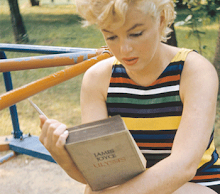Lost Girls: Once upon a time, there was a little girl called Wendy Darling

When we meet Wendy Darling in the first volume of Lost Girls, this middle-aged woman is sexually repressed, frustrated and silent. Unlike
Back in the hotel room, Wendy and Harold share a mundane, domestic conversation, but the shadows cast by their forms against the walls of their hotel room betray their latent desires. As they search the hotel room for Harold’s misplaced business papers, their silhouettes conspire, often improbably, to reflect the couple engaged in foreplay. As the shadow-Harold appears to enter his wife from behind, real-Harold benignly discusses work prospects;
“Of course, for me it’s the challenge that’s the thing: doing something you haven’t tried before. Realizing your opportunity and seizing the moment…”
For a moment, the grouping of text in one isolated speech bubble allows the reader to pretend that shadow and reality are finally aligning; that Harold and Wendy may one day find themselves sexually compatible…until Harold finishes with “Just imagine promotion, sales division manager…”, neatly placed in a separate frame. Eventually, sadly, gently, truth and fantasy marry up as Wendy rests her head on her husband’s shoulder, in both shadow and full-colour form.
That night, Wendy is tormented by the sounds of Alice and Dorothy enjoying uninhibited pleasure as she takes a bath in the hotel. Harold, meanwhile, dreams of orgies composed of the sounds he hears from next door and Venus and Tannhauser. Although both craving the same thing, they cannot bear to ask it of each other. While there may be tenderness and companionship in this marriage, there’s a helluva lot of sexual repression and dissatisfaction.
Wendy’s compulsion to watch the bellboy undress and her voyeuristic eavesdropping on Alice and Dorothy undermines her carefully composed image of the pure, “good” woman. But why is Wendy plagued with such guilt about her sexual desires and what stops her from sharing these with her husband? When Wendy is discovered spying on Dorothy and Alice, bent over eachother’s bodies like playing cards (check the Caroll ref) by the pool, she is brought to tears. As
“I-I came to listen. I didn’t know you’d be…I overheard what you said at breakfast…a-and last night about dream worlds. When you were young… You see that’s my story. I’ve never told anyone else about it.”
Witnessing, watching their explicitly female sexuality returns Wendy to the turning point in her sexuality, her first voyeuristic experience, and gives her the courage and starting point from which to address her own sexual development. Perhaps most uncomfortably for readers, and as it turns out, the censors, this means retreating to fantasy worlds and returning to childhood.
When
“Now then…Mrs. Potter, I am Lady Fairchild. My companion is Miss Gale. Fate, seemingly has brought us to the Himmelgarten for a reason. Therefore, I propose we devote this afternoon to storytelling. Just the three of us. Together.”
(more on Wendy to follow over the coming weeks)


0 Comments:
Post a Comment
Subscribe to Post Comments [Atom]
<< Home